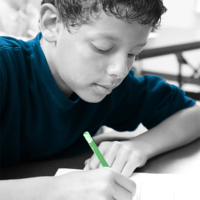Royal Free Hospital Children’s School (RFHCS) has been running a specific programme to address the needs of a cohort of anxious and vulnerable children for the last 4 years – many of whom exhibit signs of emotionally based school refusal.
Featured in the TES – this ‘challenge’ model includes three elements agreed by students, namely: co-operation, contribution and consideration (for self and others). Learn key elements of the programme and the evaluation which used both qualitative and quantitative measures to gain the students’ views of the challenge model, across several months.
About the evening
RFHCS has been running a specific programme to address the needs of a cohort of anxious and vulnerable children for the last 4 years – many of whom exhibit signs of emotionally based school refusal. Featured in the TES – this ‘challenge’ model includes three elements agreed by students, namely: co-operation, contribution and consideration (for self and others). There is an emphasis on the children taking responsibility with support from the adults, and an expectation that the student and the staff members are ‘holding the line together’.
The Headteacher does not believe in the school simply being a ‘safe haven’ but instead a supportive, safe place where the students are also expected to put in high levels of effort to develop and grow, ready for the next steps of their life. The aim is to increase students’ sense of belonging and the ethos is that ‘nobody gets left behind’ and each student’s emotional and academic development and progress is carefully monitored. This model has been highly successful in ensuring young people achieve in spite of any mental health challenges they have.
Alex Yates will outline the key elements of the programme and Dr. Sarah Cryer will talk through her evaluation which used both qualitative and quantitative measures to gain the students’ views of the challenge model, across several months.
Key takeaways
- Learn about RFHCS ‘The Challenge Model’ that addresses the needs of a cohort of anxious and vulnerable
- Discover the evaluation methods and findings of ‘The Challenge Model’
- See what potential ‘The Challenge Model’ has to work in your environment
Who is it for
This twilight event would be beneficial to those who work in the education and social work sector, including;
- Educational psychologists
- SENCOs
- Hospital school staff
- Teachers and support staff
- Social workers
Additionally, those working in health setting:
- CAMHS professionals
- Paediatricians
- Occupational therapists
- Counsellors
- Clinicians
- Those that work with children affected with mental health issues
About the speakers
Alex Yates
Alex has 15 years experience in school leadership, in alternative and mainstream settings. He is Headteacher at The Royal Free Hospital Children’s School, a community special school and a leading practice school for mental health and well-being. Alex is a director of the new National Association for Hospital Education and a regular contributor to the Times Educational Supplement.
Dr. Sarah Cryer
Sarah is an Educational Psychologist, currently working in the Local Borough of Camden. She has developed a specialism in working with children and young people who have experienced trauma.
Sarah is seconded as the Educational Psychologist to the Virtual School for Looked after Children and the innovative project, Right Balance for children and families. This new approach to social work is for children aged 10-13, and their families, who are receiving support from social care in Camden. She has adopted a specialism in her work with deaf children and young people and she holds qualifications in British Sign Language.

